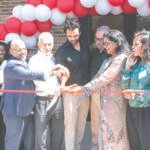In Your Opinion: NJDEP Can Stop Environmental Threats Posed By Compressor Station 206 and NESE
Submitted by the Franklin Township Task Force on Compressor Station 206 and NESE.
The New Jersey Department of Environmental Protection (NJDEP) wrote: “The use, enjoyment, and existence of uncontaminated natural resources is a right common to the general public” in their March 27, 2019 lawsuit against E.I. DuPont DeNemours & Co. in the Parlin section of Old Bridge, found at https://www.nj.gov/oag/newsreleases19/Parlin_Filed-Complaint_and_Jury-Demand.pdf.
Governor Murphy wants New Jersey to “regain its place as a national clean energy leader” with “100 percent carbon-free electricity” and to protect our New Jersey shores from fossil fuel projects damaging to “our multi-billion tourism and fishing economies”. https://www.murphy4nj.com/issue/environment/
Governor Murphy and his administrative people tout that, in June, the first phase of the Offshore Wind Turbine project proposals are expected to be granted. That is wonderful, but …
1. The climate crisis impacts from the North East Supply Ehancement Project cannot be offset by adding wind energy.
2. There is no benefit to New Jersey from the NESE Project. The NESE Project has no place in New Jersey’s plan to ensure that the State has enough energy to grow its economy in the cleanest possible manner since the gas all ends up in New York, and all the risks and harms stay in New Jersey.
3. Natural gas is not clean, and it is not a bridge to renewables. The use of natural gas as an energy source is just as harmful to our atmosphere as coal when one takes into consideration the methane that is leaked from both transmission and distribution natural gas pipelines that are not repaired or replaced unless the danger of an explosion is imminent.
4. The communities that would be most directly hurt by the pipeline part of the NESE Project are those that were devastated by Superstorm Sandy – the Bayshore areas in New Jersey and the Rockaways in New York.
Rather, NESE would:
- destroy forested acres and wetlands that help absorb excess stormwater;
- churn-up over 1 million cubic yards of toxic sediment currently buried beneath the floor of the Raritan Bay and New York Harbor that includes lead, mercury and PCBs, and spread toxins on the seafloor and our beaches;
- harm the waters, habitats and food sources for the fish and shellfish that are a large part of the Bayshore economy;
- dig through or very close to Superfund and toxic sites like the Global Sanitary Landfill Superfund Site, E.I. DuPont DeNemours & Co., and the Raritan Bay Slag Superfund Site in Old Bridge and Sayreville;
- emit tons of toxins each year – some known to cause cancer, like formaldehyde and benzene – into the air from the proposed Compressor Station 206 that would be next to another air polluting industrial facility – Trap Rock Quarry;
- leave New Jersey with decades of air pollution and increased greenhouse gases while also pushing more gas – faster and hotter – through pipelines that are at least 50 years old, hastening pipeline corrosion while risking fires and explosions; and
- lock us into a reliance on fossil fuel – when our State is committed to clean energy sources – for the 15%+ guaranteed profits for Williams/Transco from the Federal Energy Regulatory Commission.
The NESE Project’s applications for water permits must be granted or denied by June 5 according to NJDEP procedures.
Isn’t it time for the NJDEP to make sure that they avoid future expensive cleanups from toxic sites by not giving permits that would degrade the water quality in the Raritan Bay, threaten drinking water of those living in Old Bridge, Sayreville and Perth Amboy, and risk the damage from erosion by construction of a pipeline in acid producing soils?
Isn’t it time for the NJDEP to make sure that they avoid harming the health of people visiting, living and working near the proposed Compressor Station 206 in Franklin Township that will spew air toxins that can travel five or more miles?
Isn’t it time for the NJDEP to make sure that they do not damage years of positive actions that have significantly cleaned up the water in the Raritan Bay such that whales and other marine life have returned?
Isn’t it time for Governor Murphy and the NJDEP to walk the talk about being stewards of the environment and wanting New Jersey to rapidly transition to clean energy sources?
It is time for the NJDEP to deny permits that do not meet the stringent environmental requirements of New Jersey! The NJDEP can deny the permits based on the environmental harm that the NESE Project would cause.
As Ronald Regan said in his remarks upon signing the annual report of the Council on Environmental Quality on July 11, 1984, “If we’ve learned any lessons during the past few decades, perhaps the most important is that preservation of our environment is not a partisan challenge; it’s common sense. Our physical health, our social happiness, and our economic well-being will be sustained only by all of us working in partnership as thoughtful, effective stewards of our natural resources.”
Our Governor and your State Senators and Assemblymen/women need to hear from you during the month of May!
Speak up often – Let Governor Murphy and the NJDEP know that we expect them to deny the water permits for the NESE Project.
- Take a few minutes as often as you can and call Governor Murphy between 9AM and 5PM at 866-586-4069 or 609-292-6000 and tell him that you expect the NJDEP to deny the water permit applications from Transco for the Northeast Supply Enhancement (NESE) Project by June 5.
- Call your state Senators and Assemblymen/women and encourage them to speak up to let the NJDEP know that they expect the NJDEP to protect their constituents and the environment by denying the permit applications for the NESE Project by June 5.























































